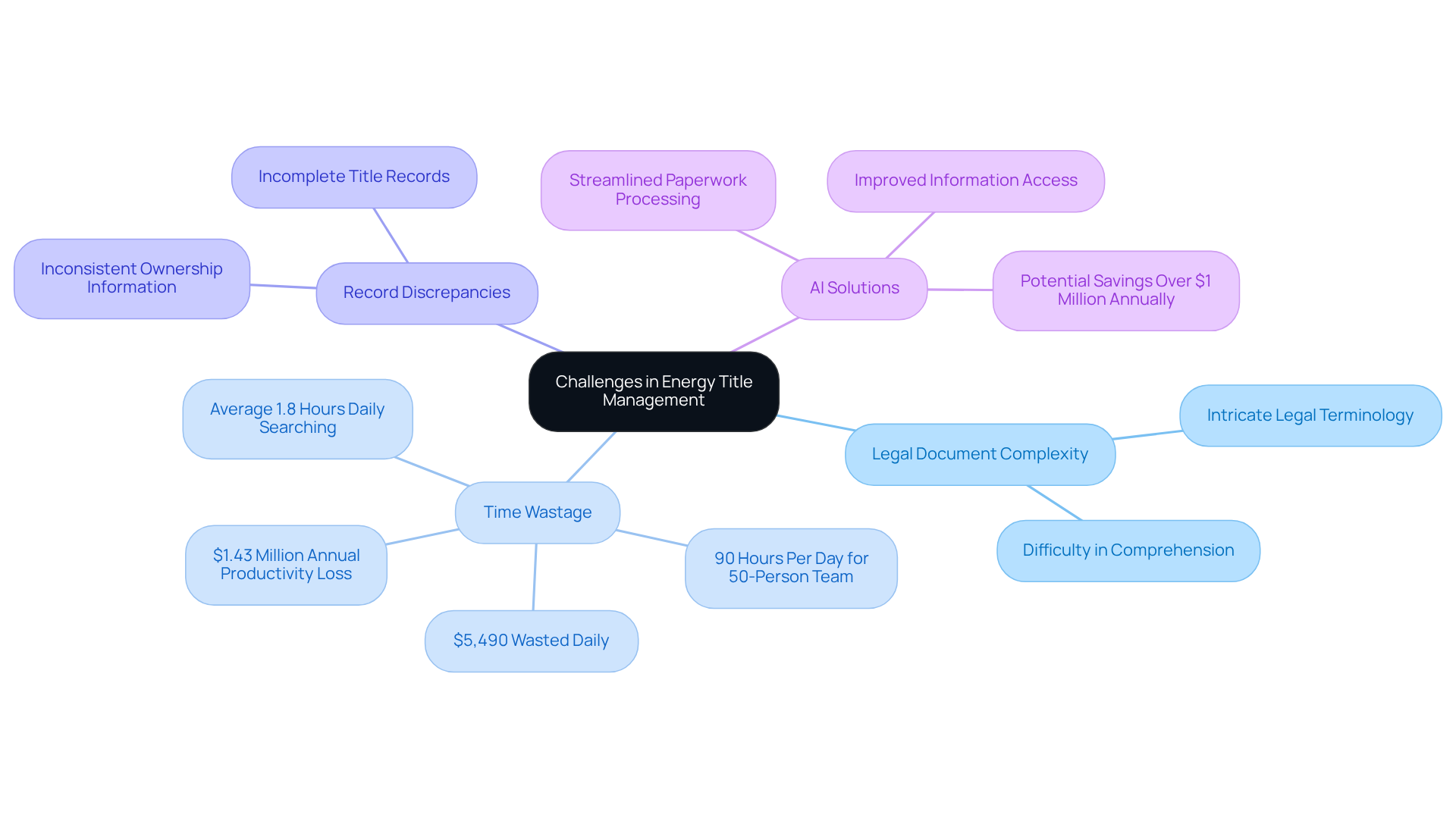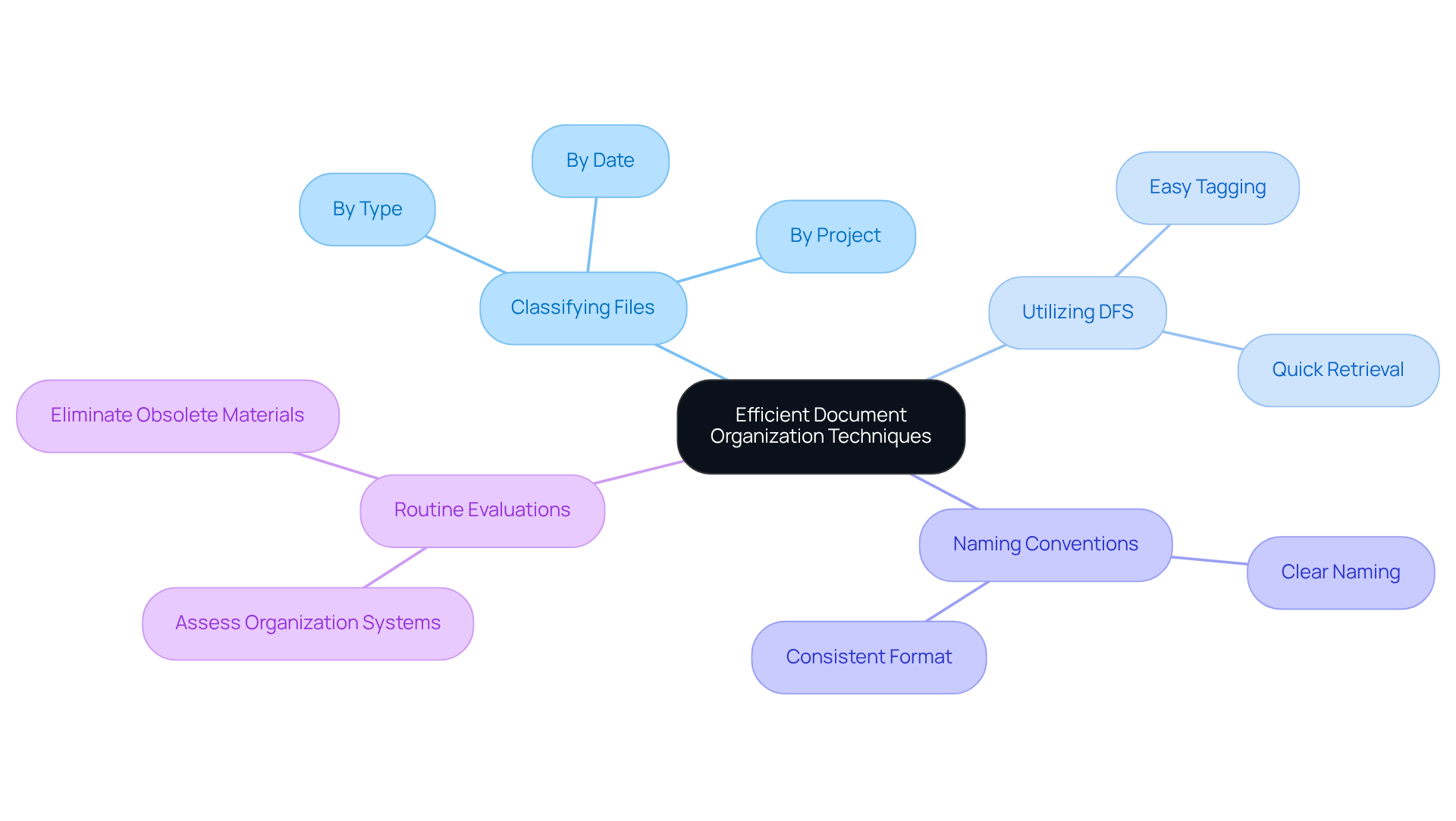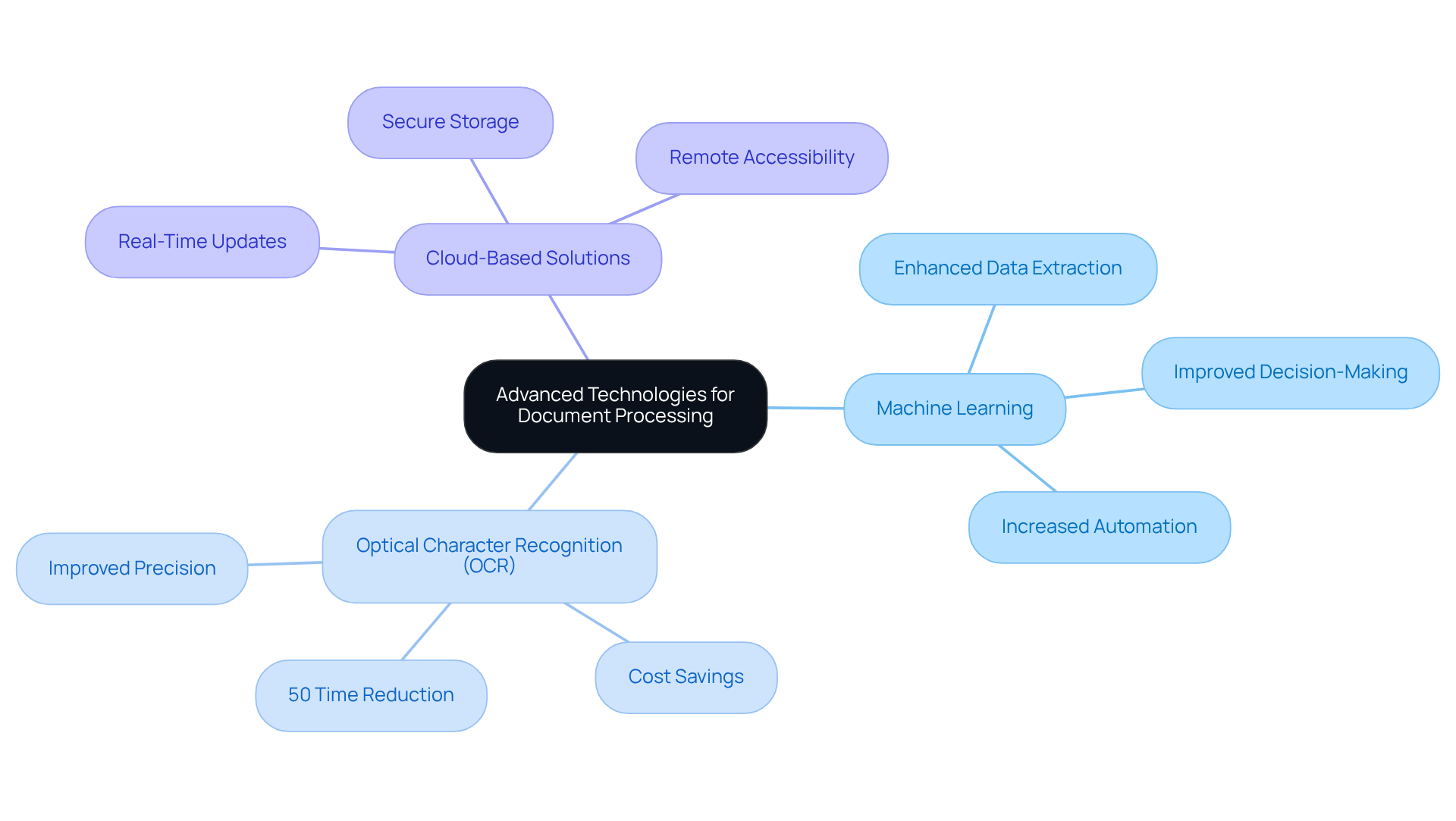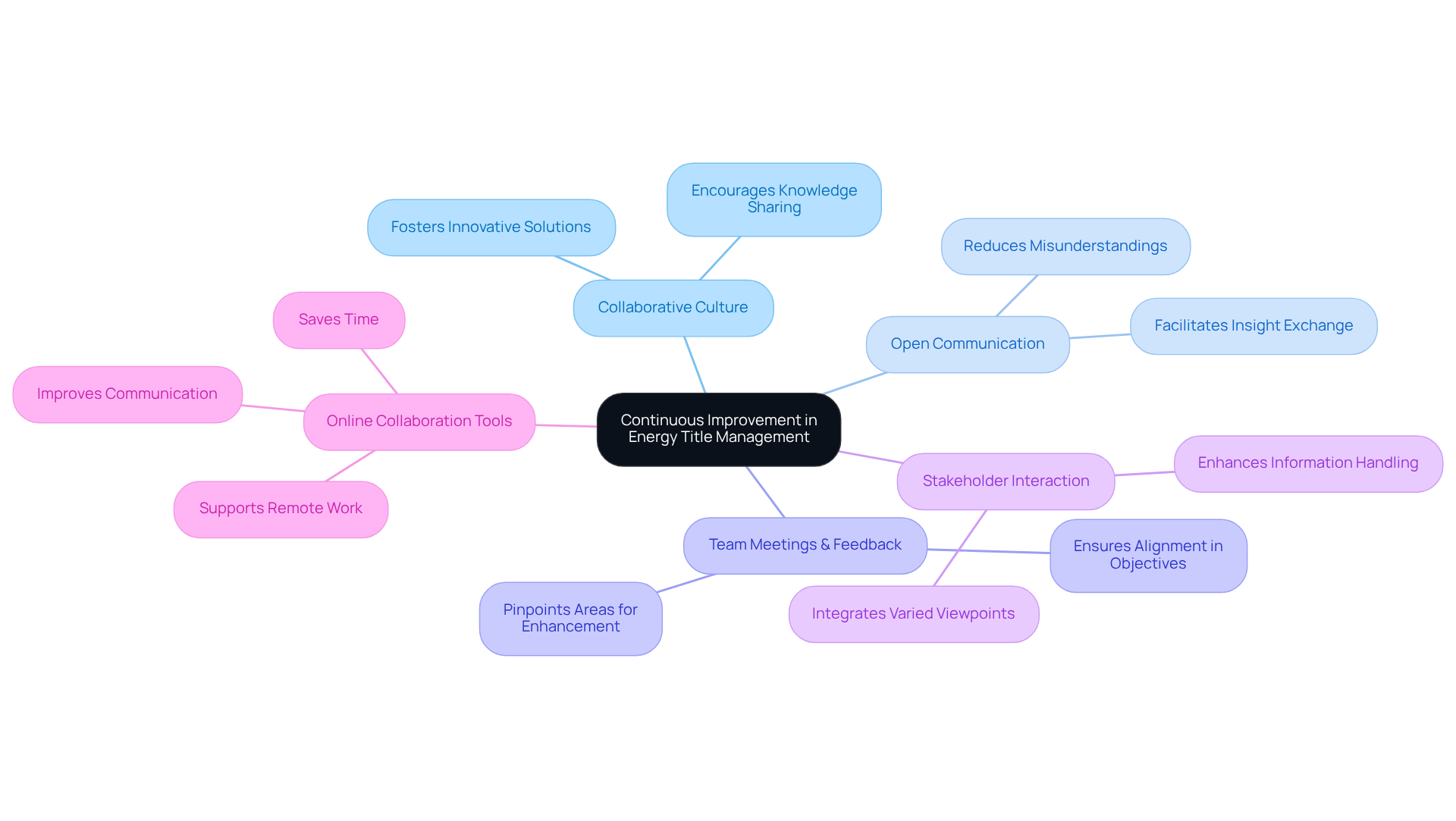Overview
The article delineates four strategies for effective document management in energy title management, emphasizing:
- Systematic organization
- Advanced technologies
- Cultivation of collaboration
These strategies are vital due to the intricate nature of legal documents in the energy sector, which often results in inefficiencies and inflated costs. Implementing AI and cloud-based solutions can markedly enhance productivity and accuracy in document handling, thereby addressing these challenges head-on.
Introduction
Navigating the intricate world of energy title management presents unique challenges, particularly in handling complex legal documents. Professionals often spend hours searching for files; these inefficiencies can lead to costly delays and errors. This article explores four key strategies that can transform document management practices for energy titles, highlighting how advanced technologies and systematic organization can streamline processes and enhance accuracy. As the industry grapples with these persistent issues, the question remains: how can organizations effectively leverage these strategies to not only overcome existing hurdles but also foster a culture of continuous improvement?
Understand the Unique Challenges of Energy Title Management
Energy ownership management presents significant challenges, primarily due to the complexity of legal documents. These documents often contain intricate that can be difficult to comprehend, particularly for individuals lacking specialized training. Consequently, real estate professionals frequently encounter incomplete or inconsistent title records, resulting in .
In fact, the average worker dedicates approximately 1.8 hours each day to searching for files, culminating in an annual productivity decline of around $1.43 million for organizations. Moreover, a typical 50-person engineering team spends an astonishing 90 hours per day seeking information, highlighting the magnitude of the issue.
Furthermore, discrepancies in exacerbate these challenges, necessitating to effectively navigate these complexities. As Sandra Bembenek, an expert in technology projects within the energy sector, notes, "Utilizing and improve information access, greatly enhancing efficiency and adherence in ."
Recognizing these challenges is crucial for implementing that in energy property oversight. Furthermore, can yield savings exceeding $1 million annually for teams, making it a prudent investment for real estate professionals.

Implement Efficient Document Organization Techniques
To enhance , energy title experts must adopt within the framework of . This involves:
- Classifying files by type, project, or date.
- Utilizing (DFS) that facilitate easy tagging and retrieval.
- Establishing a clear naming convention for files to expedite searches.
- Conducting routine evaluations of file organization systems to ensure that obsolete or unrelated materials are eliminated, thus maintaining a streamlined and effective system.
By embracing these methods, teams can significantly reduce the time spent on information retrieval and improve accuracy in handling names.

Utilize Advanced Technologies for Document Processing
, particularly machine learning and , are revolutionizing the processing of energy ownership records. These innovations from property records, drastically reducing the time spent on manual input and significantly lowering error rates.
Organizations that have adopted OCR technology, for instance, report processing time reductions of up to 50%, leading to and enhanced precision in document oversight. A financial services company saved approximately $2.9 million annually by halving its manual extraction staffing.
Implementing a document management system (DMS) that leverages these technologies enables and ensures straightforward access to the most current information, fostering collaboration among team members, particularly in . Furthermore, cloud-based solutions offer secure storage and remote accessibility, which are essential for modern workflows.
Notably, 73% of Shift Leaders prioritize to streamline remote work, underscoring its critical role in contemporary operations. By embracing these advanced technologies, organizations can significantly enhance their operational efficiency and precision in document management for energy titles, ultimately leading to improved decision-making and superior service delivery.

Foster Continuous Improvement Through Collaboration
To drive , cultivating a is paramount. Open communication among group members facilitates the exchange of insights and best practices, to common challenges.
Furthermore, regular team meetings and in pinpointing areas for enhancement, ensuring alignment in objectives across the team. Moreover, interacting with outside stakeholders, such as , enhances the information handling process by integrating varied viewpoints.
Focusing on collaboration not only fosters a dynamic setting favorable for continuous improvement but also greatly enhances efficiency in . Statistics indicate that can save time and improve communication, which is crucial in the real estate sector. Tools like SharePoint and support remote work, making them invaluable for document management for energy titles.

Conclusion
Effective management of energy titles is essential for navigating the complexities associated with property ownership. Addressing the unique challenges of energy title management enhances efficiency and accuracy in operations. By implementing systematic organization techniques, leveraging advanced technologies, and fostering collaboration, professionals can transform document management processes.
Understanding the intricate legal landscape of energy titles is crucial, as it often leads to inefficiencies and delays. Practical approaches such as:
- Classifying files
- Utilizing digital systems
- Adopting OCR technology
streamline document processing. Furthermore, emphasizing a collaborative culture underscores the value of shared insights and continuous improvement, vital for overcoming common challenges in the sector.
In conclusion, embracing these best practices not only saves time and reduces costs but also significantly enhances decision-making and service delivery in energy title management. As the industry evolves, adopting these strategies will be crucial for real estate professionals aiming to stay competitive and efficient. Prioritizing effective document management will ultimately lead to better outcomes for teams and stakeholders alike.
Frequently Asked Questions
What are the main challenges of energy title management?
The main challenges include the complexity of legal documents, which often contain intricate legal terminology that is difficult to comprehend. This leads to incomplete or inconsistent title records, causing delays in transactions and increased costs.
How much time do workers spend searching for files related to energy title management?
The average worker spends approximately 1.8 hours each day searching for files, resulting in an annual productivity decline of about $1.43 million for organizations.
What is the impact of information searching on engineering teams?
A typical 50-person engineering team spends around 90 hours per day seeking information, highlighting the significant impact of information searching on productivity.
How do discrepancies in property ownership records affect energy title management?
Discrepancies in property ownership records create challenges that require accurate and timely information to navigate effectively.
What solutions can help improve energy title management?
Utilizing AI solutions can streamline paperwork processing and improve information access, enhancing efficiency and adherence in energy ownership oversight.
What are the potential savings from implementing AI-driven document management in energy title management?
AI-driven file organization can yield savings exceeding $1 million annually for teams, making it a valuable investment for real estate professionals.




